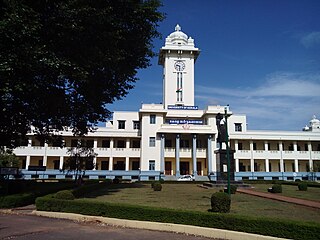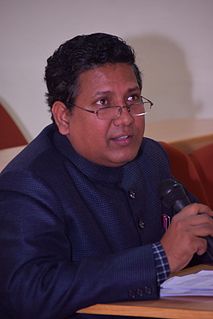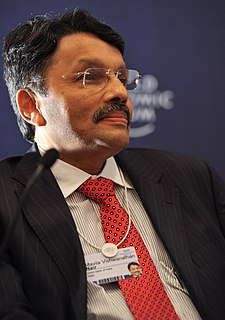
Education in India is primarily managed by state-run public education system, which fall under the command of the government at three levels: central, state and local. Under various articles of the Indian Constitution and the Right of Children to Free and Compulsory Education Act, 2009, free and compulsory education is provided as a fundamental right to children aged 6 to 14. The approximate ratio of public schools to private schools in India is 7:5.

Indian Institute of Management Ahmedabad is a business school located in Ahmedabad, Gujarat, India. The school has been accorded the status of an Institute of National Importance by Ministry of Human Resources, Government of India in 2017. Established in 1961, the institute offers master's degree programs in management and agri-business management, a fellowship program and a number of executive training programs. The institute's founding director is Ravi J. Matthai. Other notable founding figures were the Indian physicist Vikram Sarabhai, Indian businessman Kasturbhai Lalbhai and Indian educator Kamla Chowdhary.

The Indian Institute of Planning and Management (IIPM) was an unaccredited institute headquartered in New Delhi, which previously had 18 branches across India. The institute has been widely criticized for false advertisements and fraudulent practices. After several controversies, the school's Honorary Dean Arindam Chaudhuri decided to shut down all campuses across India, except the one in Delhi. Founded in 1973, the institute used to offer undergraduate, postgraduate and doctoral programmes in national economic planning and entrepreneurship, and international and fellowship programmes. Its executive education programmes include non-credit courses and visits to foreign business schools. IIPM is not accredited by UGC or All India Council for Technical Education (AICTE), and is not affiliated with the public Indian Institutes of Management.

Arindam Chaudhuri is an Indian national best known for his involvement with the now-defunct Indian Institute of Planning and Management, an unaccredited institute that was previously headquartered in New Delhi and had 18 branches across India. The institute has been widely criticized for false advertisements and fraudulent practices. On 23 August 2020, Chaudhuri was arrested for tax evasion of ₹230 million (US$2.9 million).
The Deutsche Gesellschaft für Internationale Zusammenarbeit (GIZ) GmbH, often shortened to simply GIZ, is the main German development agency headquartered in Bonn and Eschborn that provides services in the field of international development cooperation and international education work. It is the organization's self-declared goal to deliver effective solutions that offer people better prospects and sustainably improve their living conditions.
The Ministry of Environment, Forest and Climate Change (MoEFCC) is an Indian government ministry. This ministry is headed by Secretary Rank senior most IAS officer. The ministry portfolio is currently held by Bhupender Yadav, Union Minister of Environment, Forest and Climate Change.

National Bank for Agriculture and Rural Development (NABARD) is an apex regulatory body for overall regulation of regional rural banks and apex cooperative banks in India. It is under the jurisdiction of Ministry of Finance, Government of India. The bank has been entrusted with "matters concerning policy, planning, and operations in the field of credit for agriculture and other economic activities in rural areas in India". NABARD is active in developing and implementing financial inclusion.
Previously a neglected aspect of the Indian Central government, Education in Odisha is witnessing a rapid transformation. Its capital city, Bhubaneswar, is emerging as a knowledge hub in India with several new public and private universities, including the establishment of an Indian Institute of Technology after five decades of demand.

The importance and antiquity of education in Kerala is underscored by the state's ranking as among the most literate in the country. The educational transformation of Kerala was triggered by efforts of the Church Mission Society missionaries, who were the pioneers that promoted mass education in Kerala, in the early decades of the 19th century. The local dynastic precursors of modern-day Kerala—primarily the Travancore Royal Family, the Nair Service Society, Sree Narayana Dharma Paripalana Yogam and Muslim Educational Society (MES)—also made significant contributions to the progress on education in Kerala. Local schools were known by the general word kalaris, some of which taught martial arts, but other village schools run by Ezhuthachans were for imparting general education. Christian missionaries and British rule brought the modern school education system to Kerala.

The Centre for Development Studies (CDS), Thiruvananthapuram, Kerala, India is a premier Social Science research institute. It is also a higher education institution providing M.A. course in applied economics and PhD course in economics. It is a very reputed institution internationally also. Its main objective is to promote research, teaching and training in disciplines relevant to development.

The state of Uttar Pradesh had a small tradition of learning, although it had remained mostly confined to the elite class and the religious establishment.
Kiran Karnik is a prominent Indian administrator chiefly known for his work in the broadcasting and outsourcing industries. Presently he is also serving as a Director in Central board of directors of Reserve Bank of India. He is also the chairman, board of directors, of the Indraprastha Institute of Information Technology, Delhi (IIIT-D).

K M Baharul Islam is presently the Chairperson of Centre of Excellence in Public Policy and Government at Indian Institute of Management Kashipur. He served as the Dean (Academics) during 2019-2021 at the same institute. He was elected as a Fellow of the Royal Asiatic Society of Great Britain and Ireland on 18 March 2020. In October 2021, he was invited as a Visiting Professor at the London School of Economics.

Mavila Vishwanathan Nair is the Chairman of the Credit Information Bureau of India Limited, India's largest credit bureau. He is also an advisor select private equity and venture capital funded companies in India.
The National Institute of Personnel Management (NIPM) is a professional association for human resource management professionals. It is headquartered in Kolkata, India. The organisation was founded in 1980 after the merger of IIPM and NILM. NIPM has about 11,000 members spread over 49 chapters all over the country.

The National Institutional Ranking Framework (NIRF) is a methodology adopted by the Ministry of Education, Government of India, to rank institutions of higher education in India. The Framework was approved by the MHRD and launched by Minister of Human Resource Development on 29 September 2015. Depending on their areas of operation, institutions have been ranked under 11 different categories – overall, university, colleges, engineering, management, pharmacy, law, medical, architecture, dental and research. The Framework uses several parameters for ranking purposes like resources, research, and stakeholder perception. These parameters have been grouped into five clusters and these clusters were assigned certain weightages. The weightages depend on the type of institution. About 3500 institutions voluntarily participated in the first round of rankings.











